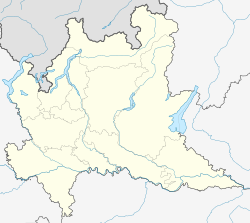Porto Valtravaglia
Porto Valtravaglia | |
|---|---|
| Comune di Porto Valtravaglia | |
 Porto Valtravaglia | |
 | |
| Coordinates: 45°58′N 8°42′E / 45.967°N 8.700°E | |
| Country | Italy |
| Region | Lombardy |
| Province | Varese (VA) |
| Frazioni | Ligurno, Muceno, Musadino, San Michele, C.na Profarè, C.na Bassa, Monte Pian Nave, Monte della Colonna, Monte Ganna, Domo, Torre, Casa Piano Croce |
| Government | |
| • Mayor | Bruno Virgilio Barassi |
| Area | |
| • Total | 16.0 km2 (6.2 sq mi) |
| Elevation | 199 m (653 ft) |
| Population (Dec. 2004)[2] | |
| • Total | 2,464 |
| • Density | 150/km2 (400/sq mi) |
| Demonym | Portovaltravagliesi |
| Time zone | UTC+1 (CET) |
| • Summer (DST) | UTC+2 (CEST) |
| Postal code | 21010 |
| Dialing code | 0332 |
| Patron saint | Madonna Assunta |
| Saint day | August 15 |
| Website | Official website |
Porto Valtravaglia is a comune (municipality) of c. 2,400 inhabitants in the Province of Varese in the Italian region Lombardy, located about 70 kilometres (43 mi) northwest of Milan and about 20 kilometres (12 mi) northwest of Varese.
Porto Valtravaglia borders the following municipalities: Brezzo di Bedero, Brissago-Valtravaglia, Casalzuigno, Castelveccana, Duno, Ghiffa and Oggebbio.
Dario Fo, Nobel Prize in literature of 1997, spent his childhood and adolescence here, and the little village played a central role in the development of his artistic specificity and production. In fact, it was the mix of people from different countries, working at the local, renowned blown glass factory and speaking an array of languages, that inspired the creation by Fo of the Grammelot, an original new idiom mixing a number of regional dialects. Listening to the stories told by the inhabitants of the village, typically fishermen, peasants, glass blowers and smugglers, then, introduced and trained him to the art of storytelling, of which he was a great representative. Eventually, it was again the local population, often busy with nightly jobs, who inspired one of his novels, "Il paese dei Mezarat" (the village of the bats).
Demographic evolution
[edit]
References
[edit]- ^ "Superficie di Comuni Province e Regioni italiane al 9 ottobre 2011". Italian National Institute of Statistics. Retrieved 16 March 2019.
- ^ All demographics and other statistics: Italian statistical institute Istat.
External links
[edit]- Official website (in Italian)


 French
French Deutsch
Deutsch



